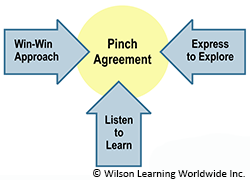Managing Conflict
Unresolved conflict in the workplace affects organisational performance, and even causes individuals to leave the organisation or "stay and leave." Leaders who cannot manage conflict well not only experience the negative aspects of destructive conflict - they cannot reap the creative benefits of constructive conflict.
Leading for Performance- Managing Conflict (LFP-MC) is based on a collaborative, win-win approach called Changing the Game. The module teaches first-line and mid-level managers indispensable techniques and skills for managing conflict effectively so that conflict can be an opportunity rather than a crisis.
Programme Outcomes
LFP-MC enables organisations to gain a competitive advantage using an effective approach to managing constructive conflict and resolving unproductive conflict before it interferes with work, personal relationships and productivity.
Approach
Further Reading:
LFP-MC is a half-day instructor-led module that can be facilitated by Wilson Learning or by a leader-trained in-house professional. This enables:
- Face-to-face interaction among the participants and the facilitator
- True-to-life skills practice with immediate in-person feedback
- The opportunity for real-time commitment to action
Managing Conflict
| Key Learnings Are... | Your Leaders Will... |
|---|---|
|
The Challenge of Conflict |
Be able to take personal responsibility and develop a win-win attitude toward problem solving. |
|
Resolving Conflict |
Be able to describe different reaction styles and how they affect the outcome of the conflict. Be able to use proven tools and approaches to "change the game" in conflict situations. |
Enabling Improved Performance
LFP-MC features the Managing Conflict Planner and Job Aid Card so the participants can fine-tune and apply their newly acquired skills and behaviours on the job. Involving management to ensure alignment on an approach to creative conflict management and training them to coach for improved performance is important for a successful implementation.
Measurement And Evaluation
Client Results:
Organisations that implement LFP-MC have access to a broad range of tools to measure initial behavioural changes and business results. For LFP-MC, one approach may be to utlise a case study, to examine the cause and effects of conflicts before and after LFP-MC.
To learn more about measuring the impact of learning, visit Measurement and Evaluation Services.



 Please complete this form to download the factsheet for Managing Conflict.
Please complete this form to download the factsheet for Managing Conflict.



